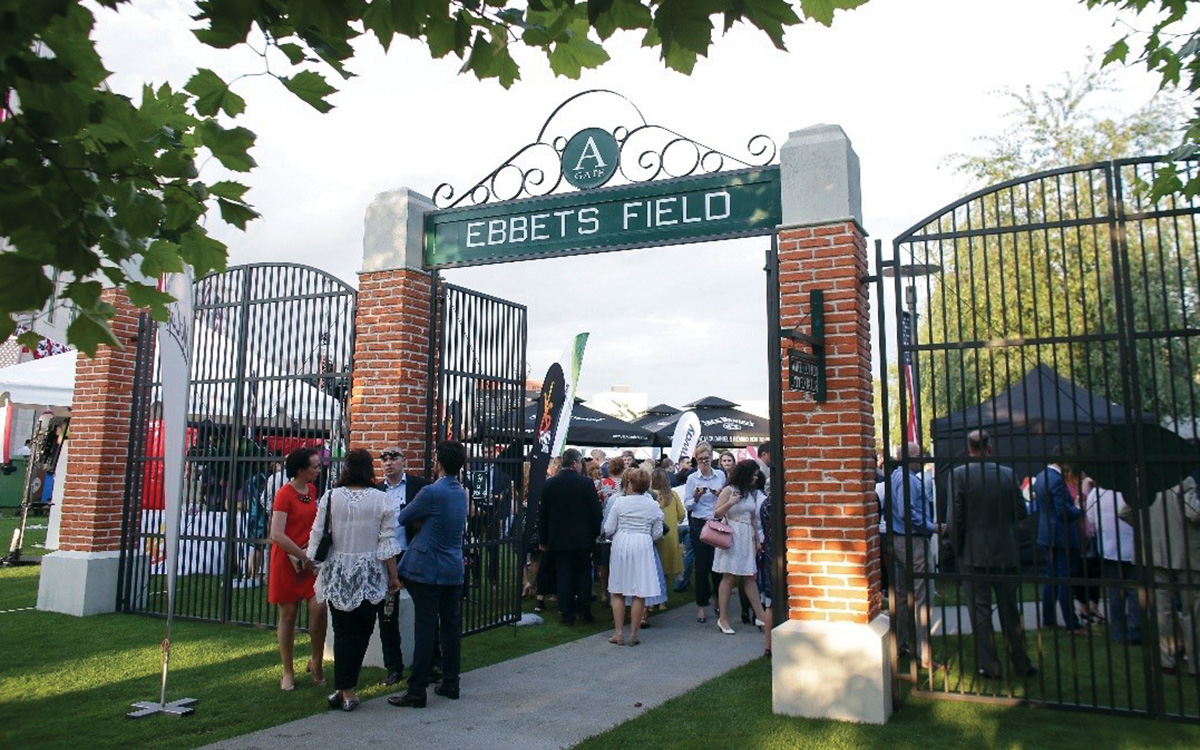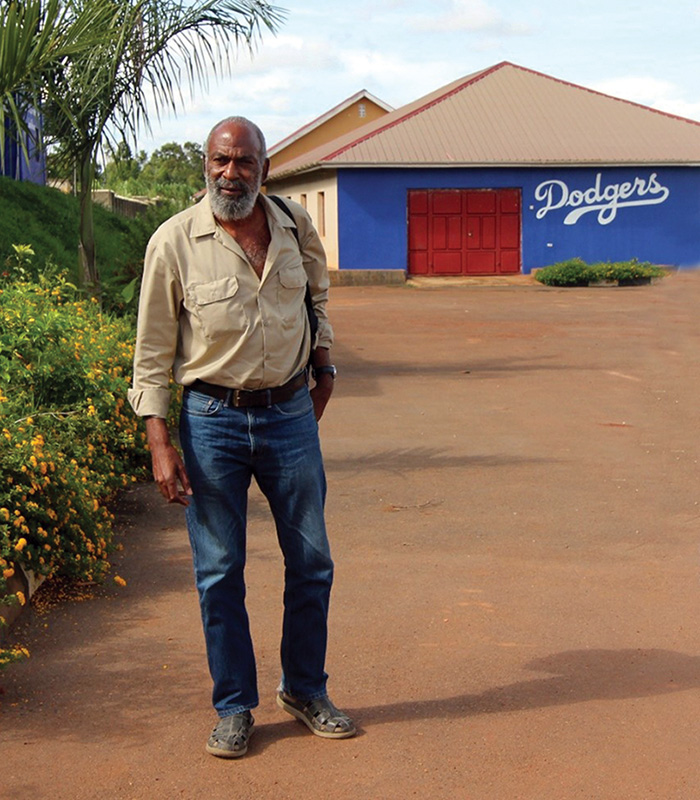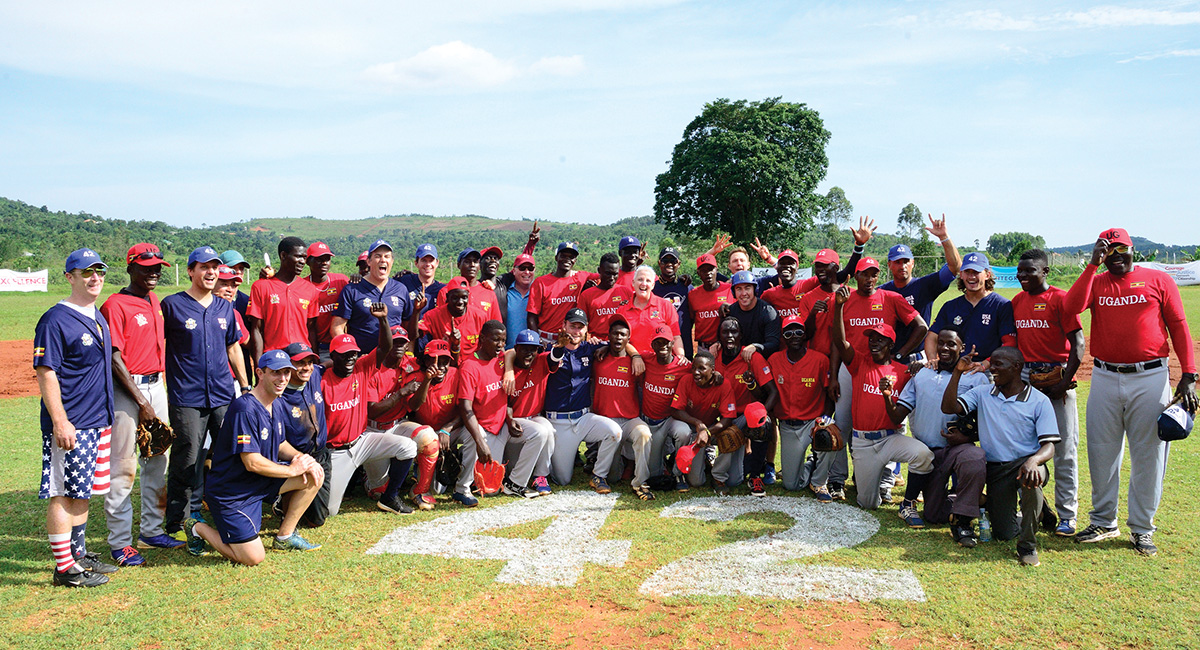The Legacy of Jackie Robinson
Through baseball diplomacy the youth of Romania and Uganda learned important lessons.
BY RONALD E. HAWKINS JR.

Embassy Bucharest staff welcome guests at the gate to “Ebbets Field” in 2017.
U.S. Embassy Bucharest / Lucian Crusoveanu

David Robinson, son of Jackie Robinson, visits the American-supported athletic training center near Kampala in 2019.
U.S. Embassy Kampala / Christopher Luvega
America’s first African American to play in Major League Baseball was the legendary Jackie Robinson, number 42. Known for his athletic prowess, Robinson demonstrated even greater skill and valor off the field. The first Black man to integrate into an all-white sport in 1947, he faced callous treatment and threats to himself and his family. Yet almost a decade before the Reverend Dr. Martin Luther King Jr. appeared on the national stage, Robinson’s response to all the insults, threats and mistreatment was principled nonviolence. The deliberate choice of nonviolence—not the lack of doing something, but the conscious act of choosing not to be violent in dealing with adversity—is central to Jackie Robinson’s powerful legacy.
Preventing violent extremism is an important issue for the national security of the United States. While diplomats can lecture on the merits of peace and nonviolence, engaging host-country youth in an interactive and relatable way has been the best approach I have found during my recent tours as a public diplomacy officer for getting this message out.
In both Romania and Uganda, promoting nonviolence and inclusion was important to bolster democracy. Both nations had had experiences either with violence in the form of protests against corrupt elements in the government turning ugly or with the mistreatment of minorities.
I was delighted to find national baseball organizations in both countries that oversee the sport, field a national team, and have a network of schools and clubs across the country. Since baseball is one of America’s best-known pastimes, the national organizations eagerly looked to us to help grow their sport. Though not our primary focus, seeing the sport grow was a nice residual outcome of our efforts. Our primary effort was to share the story of the great Jackie Robinson, who contributed so uniquely to the game of baseball and to America despite extremely challenging circumstances.

Members of the Romanian National Baseball Team at the 2017 July Fourth reception.
U.S. Embassy Bucharest / Lucian Crusoveanu
Jackie Robinson Day in Romania

With U.S. Ambassador Hans G. Klemm to his left, Romanian President Klaus Iohannes greets Sharon Robinson, daughter of Jackie Robinson, at the 2017 July Fourth reception at Embassy Bucharest.
U.S. Embassy Bucharest / Lucian Crusoveanu
In Romania in 2017, we partnered with their national baseball association to celebrate Jackie Robinson Day, April 15. We chose a Saturday as close to that date as possible and held an exhibition match between the national team of Romania and a pick-up team from the U.S. embassy. Each team donned a specially created jersey bearing Jackie’s iconic 42. Hundreds gathered to watch the event, and the ambassador’s remarks captured the theme we were messaging. Media coverage focused both on the event and the nonviolence messaging.
The U.S. embassy and the mayor of Constanta, the town on the Black Sea coast where the event was held, were so pleased with the outcome that it immediately became an annual event. The embassy also decided to make Jackie Robinson the theme of the Independence Day reception, and the embassy yard was turned into “Ebbets Field, April 15, 1947,” complete with scoreboard, antique cars, baseball decorations and food, a pitching cage and a special guest of honor—Sharon Robinson, daughter of Jackie Robinson and an author and consultant for Major League Baseball.
Ms. Robinson spent a week there elaborating on her father’s legacy, as well as sharing her newest book for young readers focused on her dad’s life. She was joined by three retired Major League Baseball players, who worked with the national baseball association to hold clinics for kids throughout Romania. At all events the theme of nonviolence was paramount.

Jackie Robinson Day in Uganda in 2019.
U.S. Embassy Kampala / Christopher Luvega
Baseball Clinics in Uganda

A baseball clinic in Uganda in 2019.
U.S. Embassy Kampala / Christopher Luvega
I did not expect to find baseball in Uganda, but there it was. The Ugandan national association was strong, and their national team almost qualified for the Tokyo Olympics. This time we designed the program a little differently. We held clinics throughout the country relying on the national association to teach the basics of the sport, while embassy staff shared Jackie Robinson’s story and the policy of nonviolence. It offered a fun way for young people to learn.
The top players from the various clinics held throughout the country were invited to a grand finale on Jackie Robinson Day in April. The culminating event was held at an athletic boarding school about an hour outside Kampala. The site was chosen because of its facilities, but also because the American philanthropist who funds it had recently started a relationship with the Los Angeles Dodgers. Robinson had played for the Brooklyn Dodgers until 1956, and the team then moved to California in 1958 to become the L.A. Dodgers.
When we approached the school and the Dodgers officials about their collaboration, their answer was a resounding yes, saying: “We are Jackie’s Team!” At the finale, the youth teams held a tournament followed by an exhibition game between the United States and Uganda. Their Olympic hopeful national team beat our ragtag band, but the day of healthy, friendly competition was well received.
The event was a big success. The audience was enthusiastic. Excellent media coverage was augmented on social media because of the participation of local celebrities. And the youth were fully engaged not only in baseball, but in talking about nonviolence. The night before all were treated to a screening of the 2013 film “42,” a biopic about Jackie Robinson.
The youth were fully engaged not only in baseball, but in talking about nonviolence.
Because the film had not been widely shown in Uganda when it was released, we decided to organize an additional screening as a red-carpet affair a month after the grand finale of the baseball clinics to highlight the importance of this American’s life and legacy. Ugandan A-listers were invited, along with the media, to meet special guest David Robinson, son of the famed baseball player and a coffee grower in Tanzania. Though flight delays unfortunately caused David Robinson to miss the screening, in later interviews and group discussions the people of Uganda got a chance to interact with him.
Through baseball diplomacy, the youth of Romania and Uganda learned important lessons. With media amplification, the broader community heard the message as well, showcasing the U.S embassies’ concern for the youth of the host countries and our creative engagement on the prevention of violent extremism.
Read More...
- “The Embassy of the United States and Robinson Cano Foundation celebrate fourth Jackie Robinson Softball Cup,” by U.S. Embassy Santo Domingo, February 1, 2014
- “Havana Hardball: Spring Training, Jackie Robinson, and The Cuban League; Sofrito,” by César Brioso and Phillippe Diederich, Foreign Affairs, March/April 2016
- “Travels with The Champ in Africa, 1980,” by Lannon Walker, The Foreign Service Journal, October 2016




